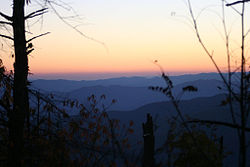Mountains-to-Sea Trail
| Mountains-to-Sea Trail | |
|---|---|

Sunset view from Clingman's Dome, the western terminus of the trail
|
|
| Length | 1150 mi (1851 km) |
| Location | North Carolina, United States |
| Designation |
National Recreation Trail North Carolina State Trail |
| Trailheads | Jockey's Ridge, Clingman's Dome |
| Use | Hiking |
| Elevation | |
| Elevation change | 6,684 ft (2,037 m) |
| Highest point | Mount Mitchell |
| Lowest point | Pamlico Sound |
| Hiking details | |
| Trail difficulty | Moderate to Strenuous |
| Sights |
Appalachian Mountains Sauratown Mountains Multiple rivers Outer Banks |
| Hazards |
American alligator American black bear Biting flies Chiggers Diarrhea from water Dog attacks Limited water Mosquitos Poison ivy Severe weather Steep grades Tick-borne diseases Traffic collisions Venomous snakes Yellowjackets |
| Surface | Natural, sand, gravel, boardwalk, asphalt |
| Website | http://www.ncmst.org/ |
The Mountains-to-Sea Trail (MST) is a long-distance trail, for hiking and backpacking, that runs across North Carolina from the Great Smoky Mountains to the Outer Banks. The trail's western endpoint is at Clingman's Dome, where it connects to the Appalachian Trail in the Great Smoky Mountains National Park. Its eastern endpoint is in Jockey's Ridge State Park on the tallest sand dune on the east coast. The trail is envisioned as a scenic backbone of an interconnected trail system spanning the state. As such, the trail's route attempts to connect as many trail systems and natural scenic areas as practicable. A little over half of the trail is complete in multiple, disconnected segments across the state.
The Mountains-to-Sea State Park Trail was made an official land-based unit of the state park system by the General Assembly on August 2, 2000. Since that time, the State Trail unit has grown to encompass 691 acres (280 ha) in three tracts and 87 acres (35 ha) in conservation easements. Each of these tracts is leased to local governments for management as nature parks, under the guidance of the NC Division of Parks and Recreation (NCDPR). The vast majority of the foot trail is located on lands not directly managed as part of its associated state park unit.
The trail is a part of the North Carolina State Trails Program which is a section of NCDPR, and as of January 2011, 530 miles (853 km) of trail has been designated as a part of the MST by NCDPR.
The segments of MST along the Blue Ridge Parkway were designated as National Recreation Trail in 2005.
...
Wikipedia
